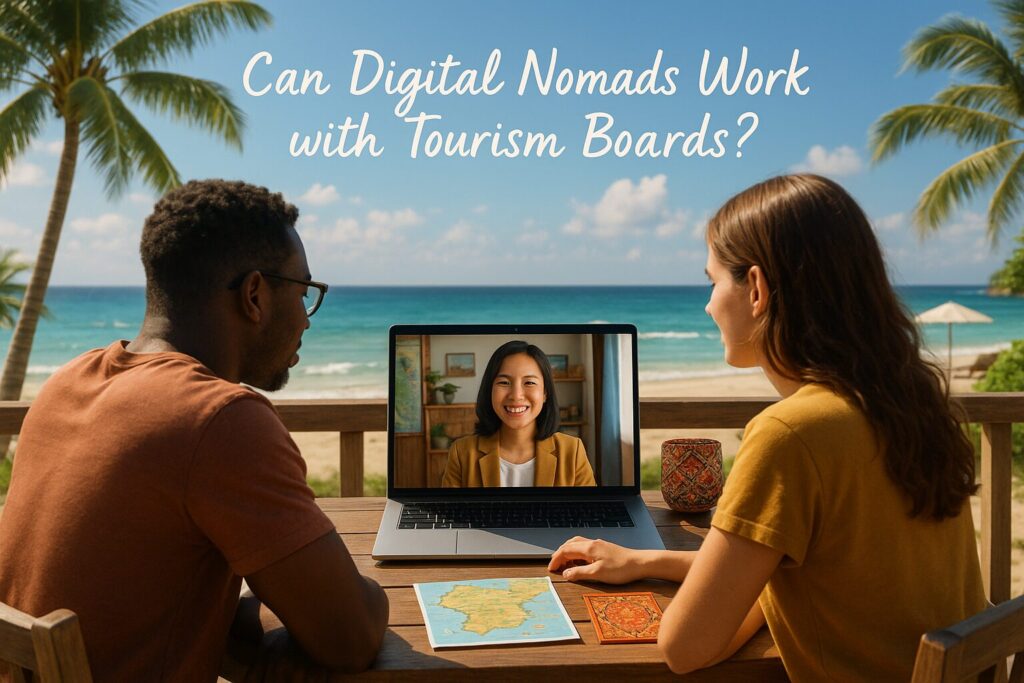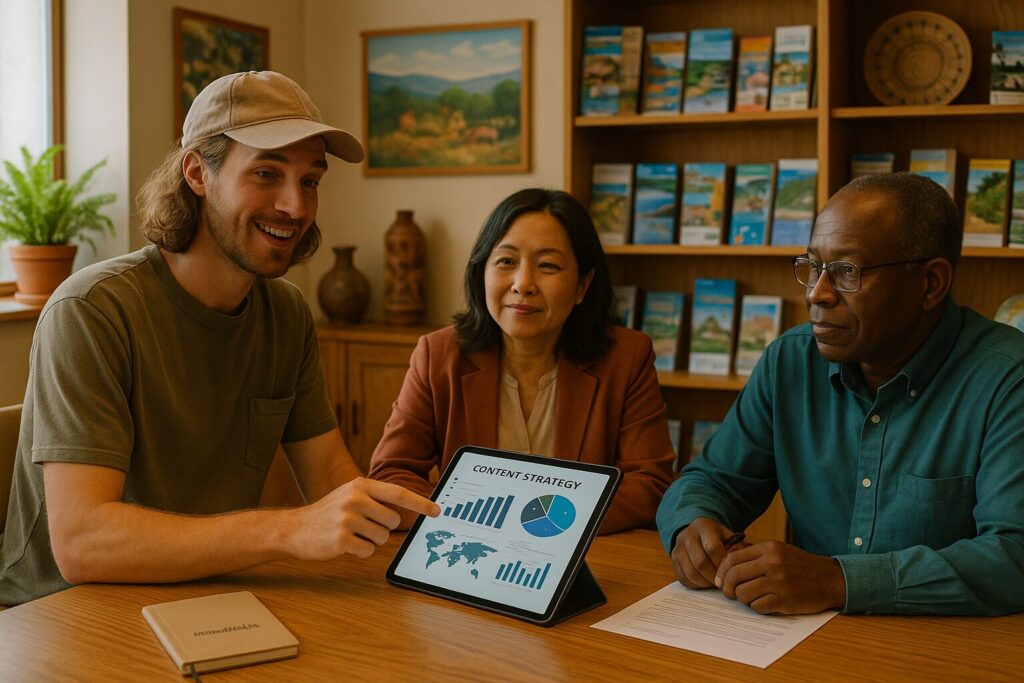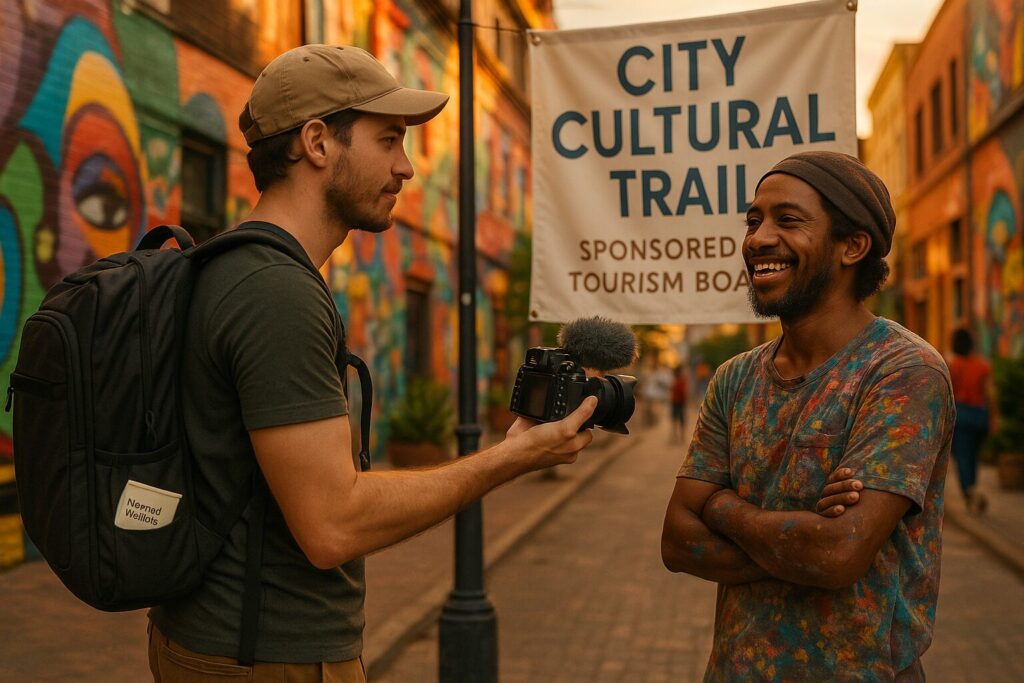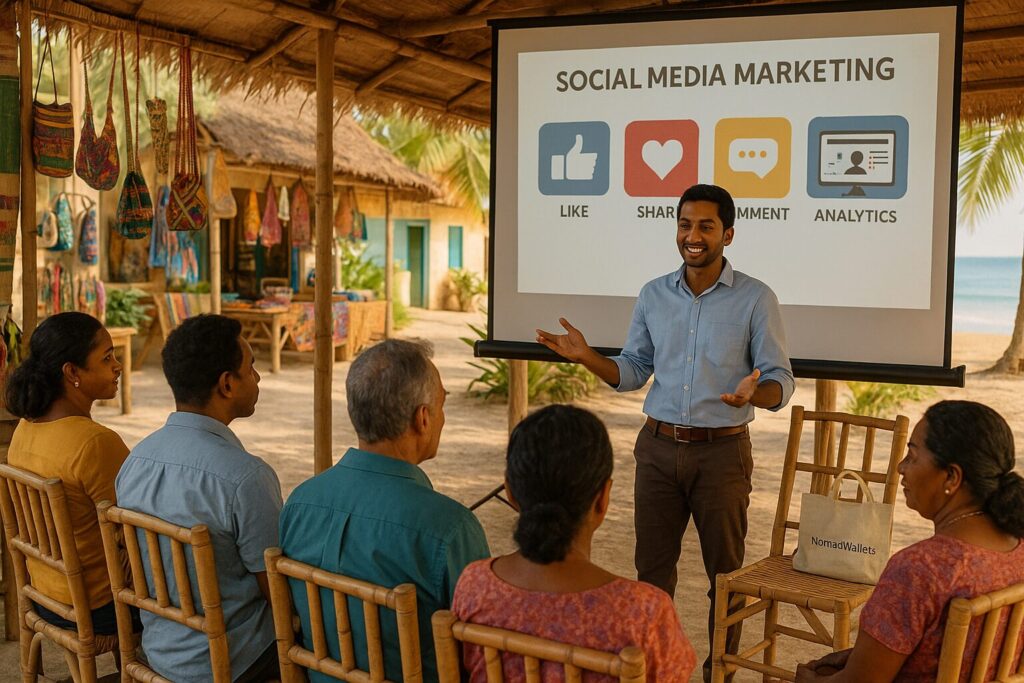
1. Introduction: Why This Topic Matters in 2025
Remember the days when tourism boards cared only about airlines and hotels? That’s changing — fast.
In 2025, a new wave of remote workers — digital nomads — has caught the eye of destination promoters worldwide. Tourism boards are now asking: Can digital nomads work with tourism boards? And more importantly, should they?
This shift is logical. Nomads don’t just travel — they stay for months, spend on co-living, coworking, local experiences, and often boost local economies. Tourism boards see this potential.
This article breaks down:
- Why collaboration makes sense in 2025
- Real examples of tourism boards working with nomads
- Practical ways you as a digital nomad can engage with tourism boards
- Challenges & tips for responsible partnerships

2. Why Digital Nomads and Tourism Boards Make Sense Together
Here are 10 real reasons tourism boards are eager to include digital nomads in their strategies:
- Year-round spending: Unlike seasonal tourists, nomads stay for months. §As seen in Cabo Verde, this reduces economic seasonality.
- Local economy boost: Nomads spend on housing, food, coworking and experiences — often more than standard travelers.
- Destination promotion: Digital nomads create content (blogs, videos, social posts) that market cities to their global following.
- Coaching and mentorship: Digital nomads often run workshops — sharing global knowledge with locals, such as in Cabo Verde.
- Infrastructure investment: Countries invest in internet, coworking spaces, and housing to attract nomads — uplifting local tech capacity.
- Visa synergy: Some destinations (e.g. Goa, Nepal) use nomad plans to support tourism growth.
- Cultural exchange: Collaborative events like tourism mixers and nomad meetups build global-community energy.
- Diversified tourism strategy: Destinations can move beyond sun-and-sand visitors to attract long-term remote work.
- Data-driven strategy (Tourism 4.0): Boards gather info on remote workers to tailor services and invest strategically.
- Sustainable tourism: Targeting nomads encourages slower, more responsible travel that benefits locals.
So yes — digital nomads work with tourism boards makes sense, particularly when both parties approach it thoughtfully.
3. Examples of Tourism Boards & Nomad Partnerships
Here are 3 real-world case studies and 10 actionable program ideas illustrating how collaboration works:
📝 Case Studies
- Indonesia (Bali): The Ministry of Tourism partnered with Airbnb via the “Live & Work Anywhere Bali” campaign promoting the B211a socio-cultural visa for nomads.The Bali Sun
- Cabo Verde: The tourism and digital economy sectors jointly invested in nomad infrastructure and events that benefit both locals and remote workers.World Economic Forum
- Goa, India: Goa Tourism Board is advocating for a Digital Nomad Visa, promoting home-stay tourism and sustainable income for locals.traveltradejournal.com

💡 10 Proven Ways Digital Nomads Work with Tourism Boards
- Testimonial campaigns or “workcation” case studies
- Become brand ambassadors—host nomad meetups and workshops
- Produce sponsored content or video tours
- Curate local experiences or guided itineraries
- Host webinars to promote destinations remotely
- Co-create nomad-specific guides or policies
- Participate in influencer campaigns for long-term stays
- Teach coworking and digital skills to locals
- Work on sustainable tourism challenges with boards
- Collaborate on data collection and strategy under Tourism 4.0 Anorak, World Economic Forum, Wikipedia
With clear goals, these programs elevate digital nomads to active, collaborative partners.

4. How You, as a Digital Nomad, Can Partner with Tourism Boards
Here are 10 steps you can take if you’re a digital nomad asking, “Can I work with tourism board?”
- Research tourism board websites for nomad or remote work initiatives
- Pitch a collaboration, like a guide or workshop
- Share feedback as a nomad-in-residence to improve visa or infrastructure
- Create and share content from the region during your stay
- Host or attend events and be visible in destination marketing
- Offer free skill exchanges—digital marketing, design, coding workshops
- Suggest local-influencer meetups or photo walks
- Attend or help organize tourism hackathons or sustainability challenges
- Join local boards or nomad advisory councils if invited
- Track data & feedback—spend, Wi-Fi quality, coworking use—so boards can adapt
You don’t need to be famous—just local, helpful, and professional. That’s how tourism boards see true partners.
5. Challenges & Considerations
Working with tourism boards as digital nomads isn’t all rainbows. Here are 10 potential pitfalls:
- Gentrification risk: Boards may boost rent/housing costs as nomad demand grows.
- Cultural friction: Nomad marketing might alienate locals if not handled sensitively.World Economic Forum
- Visa and tax confusion: Mismanagement can trigger conflicts in guest regulations.
- Sustainability concerns: Boards must avoid overtourism or resource strain.Wikipedia
- Greenwashing risks: Claiming “sustainable” programs without community involvement backfires.
- Slow bureaucracy: Tourist boards may move slower than fast nomad entrepreneurs.
- ROI unclear: Boards may struggle to track nomad impact without proper analytics.
- Tokenism: Using nomads only for marketing stunts can alienate both sides.
- Liability/legal issues: Content creators must be aware of local media laws.
- Inconsistent messaging: Nomad campaigns must align with board values to stay credible.
Understanding these challenges is critical to building ethical, effective collaborations.
6. Vision Table: Sample Program Comparison
| Program Type | Tourism Board Role | Nomad Role | Risk & Benefit |
| Workshop exchange | Host local business workshops | Teach skills & tools | Builds trust; risk: resource misuse |
| Nomad residency program | Promote visas/incentives | Create case studies, visibility | Long-term engagement; risk: housing market stress |
| Social media campaigns | Fund photoshoots/videos | Create content channels | High reach; risk: token marketing |
| Local data & insights | Share stats and spend analysis | Provide spend/travel logs | Better planning; privacy/data misuse concern |
| Hackathons for tourism | Sponsor innovation events | Help solve real local problems | Real impact; risk: low participation |
7. Concluding Thoughts & Next Steps
In 2025, more tourism boards are asking: “Can digital nomads work with tourism boards?” And the answer is a clear yes—if both sides align on goals, ethics, and mutual benefits.
When structured thoughtfully, collaborations:
- Boost local economies sustainably
- Create year-round tourism income
- Build nomad-friendly infrastructure and reputation
- Encourage cultural exchange and skill-sharing
To start:
- Approach boards with specific ideas
- Offer to run workshops or events
- Share honest feedback
- Support community-focused nomad-sustainable programs
Tourism boards thrive when they move beyond flashy image promotion toward real digital nomad partnerships. And nomads gain a stronger, more sustainable reason to choose those destinations.
References & Further Reading
- Cabo Verde digital nomad initiatives News.com.au
- Bali tourism board’s Airbnb/B211a campaign The Bali Sun
- Goa’s digital nomad visa plan to boost tourism
- Tourism 4.0 planning for inclusive travel
- Nomad influence in destination marketing
FAQs – Digital Nomads Work with Tourism Boards
Q1. Can digital nomads officially work with tourism boards?
Yes, many tourism boards now welcome collaborations with digital nomads—especially those with experience in content creation, blogging, or social media marketing. These partnerships often involve promoting destinations through storytelling, video, photography, or even consulting on digital campaigns. While not always formal employment, they’re often based on freelance or short-term contracts.
Q2. What kind of roles can digital nomads take on with tourism boards?
Digital nomads can take up roles such as:
1. Content creators (videos, blogs, reels)
2. Social media strategists
3. SEO or web consultants
4. Community engagement advisors
5. Event or campaign ambassadors1
These roles allow nomads to use their remote skills while immersing themselves in local culture.
Q3. Do I need a special visa to work with a tourism board abroad?
In most cases, yes. If the work is paid and exceeds casual volunteering, you may need a freelance visa, digital nomad visa, or a temporary work permit—depending on the country. Always check with the local embassy or immigration website before starting any official work abroad.
Q4. How can I find tourism boards open to collaborating with digital nomads?
Start by:
1. Following tourism boards on LinkedIn and Instagram.
2. Pitching your services via email with a solid media kit.
3. Attending local tourism events or co-working hub meetups in nomad-friendly cities.
4. Using platforms like Upwork, Malt, or Tourism Tribe to find relevant gigs.
Tourism boards in emerging destinations (like Portugal, Thailand, or Costa Rica) are especially open to nomad collaborations.
Q5. What are the benefits for tourism boards to work with digital nomads?
Tourism boards benefit by gaining:
1. Fresh, authentic perspectives from travelers
2. Modern digital marketing skills
3. Broader reach across international nomad networks
4. Real-time insights from people living in the destination
It’s a win-win: nomads get cultural experience and exposure, and boards get targeted digital content and storytelling.
Final Thoughts: Ready to Partner with a Tourism Board?
The world is changing—and so is travel. If you’re a digital nomad with a passion for storytelling, marketing, or building community, tourism boards might be your next best collaborators. These partnerships don’t just offer new income streams—they unlock deeper cultural immersion and real impact.
You May Also Like:
- 30 Affordable Courses for Digital Nomads in 2025 (With Tools & Tables)
Discover budget-friendly online courses to boost your digital nomad skillset — complete with tools, platforms, and a comparison table to help you choose smartly. (via NomadWallets) - Free Coworking Spaces in Cape Verde for Digital Nomads (2025 Guide)
Work beachside without breaking the bank! Explore free Wi-Fi spots, co-working cafés, and innovation hubs perfect for remote work in Cape Verde. (from the NomadWallets field guide series)
Hi, I’m Tushar a digital nomad and the founder of NomadWallets.com. After years of working remotely and traveling across Asia and Europe, I started NomadWallets to help U.S. nomads confidently manage money, travel, banking, crypto, and taxes. My mission is to make complex financial topics simple, so you can focus on exploring the world and building true location freedom.
